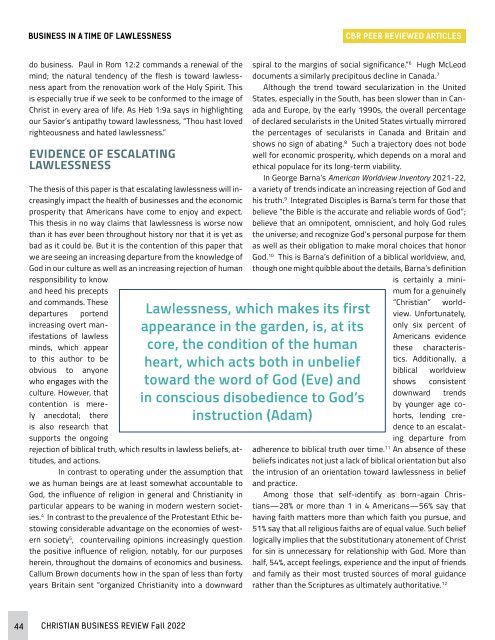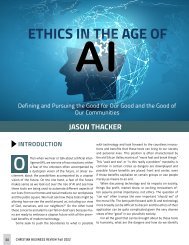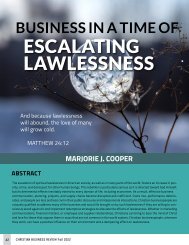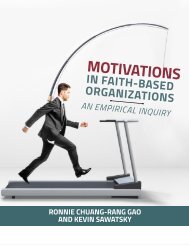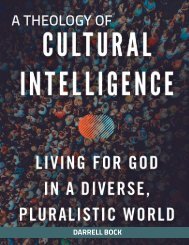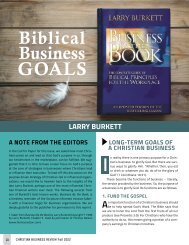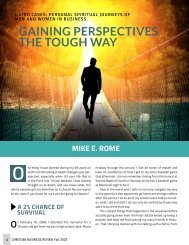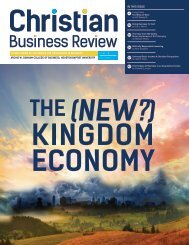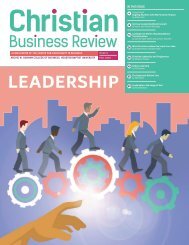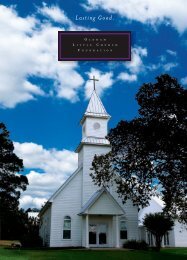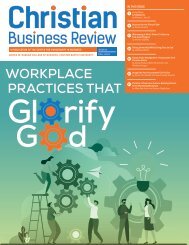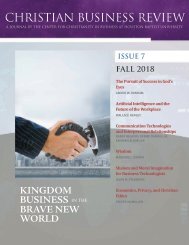Christian Business Review 2022: Pressing On Toward God's Goal
You also want an ePaper? Increase the reach of your titles
YUMPU automatically turns print PDFs into web optimized ePapers that Google loves.
BUSINESS IN A TIME OF LAWLESSNESS<br />
CBR PEER REVIEWED ARTICLES<br />
do business. Paul in Rom 12:2 commands a renewal of the<br />
mind; the natural tendency of the flesh is toward lawlessness<br />
apart from the renovation work of the Holy Spirit. This<br />
is especially true if we seek to be conformed to the image of<br />
Christ in every area of life. As Heb 1:9a says in highlighting<br />
our Savior’s antipathy toward lawlessness, “Thou hast loved<br />
righteousness and hated lawlessness.”<br />
EVIDENCE OF ESCALATING<br />
LAWLESSNESS<br />
The thesis of this paper is that escalating lawlessness will increasingly<br />
impact the health of businesses and the economic<br />
prosperity that Americans have come to enjoy and expect.<br />
This thesis in no way claims that lawlessness is worse now<br />
than it has ever been throughout history nor that it is yet as<br />
bad as it could be. But it is the contention of this paper that<br />
we are seeing an increasing departure from the knowledge of<br />
God in our culture as well as an increasing rejection of human<br />
responsibility to know<br />
and heed his precepts<br />
and commands. These<br />
departures portend<br />
increasing overt manifestations<br />
of lawless<br />
minds, which appear<br />
to this author to be<br />
obvious to anyone<br />
who engages with the<br />
culture. However, that<br />
contention is merely<br />
anecdotal; there<br />
is also research that<br />
supports the ongoing<br />
rejection of biblical truth, which results in lawless beliefs, attitudes,<br />
and actions.<br />
In contrast to operating under the assumption that<br />
we as human beings are at least somewhat accountable to<br />
God, the influence of religion in general and <strong>Christian</strong>ity in<br />
particular appears to be waning in modern western societies.<br />
4 In contrast to the prevalence of the Protestant Ethic bestowing<br />
considerable advantage on the economies of western<br />
society 5 , countervailing opinions increasingly question<br />
the positive influence of religion, notably, for our purposes<br />
herein, throughout the domains of economics and business.<br />
Callum Brown documents how in the span of less than forty<br />
years Britain sent “organized <strong>Christian</strong>ity into a downward<br />
spiral to the margins of social significance.” 6 Hugh McLeod<br />
documents a similarly precipitous decline in Canada. 7<br />
Although the trend toward secularization in the United<br />
States, especially in the South, has been slower than in Canada<br />
and Europe, by the early 1990s, the overall percentage<br />
of declared secularists in the United States virtually mirrored<br />
the percentages of secularists in Canada and Britain and<br />
shows no sign of abating. 8 Such a trajectory does not bode<br />
well for economic prosperity, which depends on a moral and<br />
ethical populace for its long-term viability.<br />
In George Barna’s American Worldview Inventory 2021-22,<br />
a variety of trends indicate an increasing rejection of God and<br />
his truth. 9 Integrated Disciples is Barna’s term for those that<br />
believe “the Bible is the accurate and reliable words of God”;<br />
believe that an omnipotent, omniscient, and holy God rules<br />
the universe; and recognize God’s personal purpose for them<br />
as well as their obligation to make moral choices that honor<br />
God. 10 This is Barna’s definition of a biblical worldview, and,<br />
though one might quibble about the details, Barna’s definition<br />
is certainly a minimum<br />
for a genuinely<br />
Lawlessness, which makes its first<br />
appearance in the garden, is, at its<br />
core, the condition of the human<br />
heart, which acts both in unbelief<br />
toward the word of God (Eve) and<br />
in conscious disobedience to God’s<br />
instruction (Adam)<br />
“<strong>Christian</strong>” worldview.<br />
Unfortunately,<br />
only six percent of<br />
Americans evidence<br />
these characteristics.<br />
Additionally, a<br />
biblical worldview<br />
shows consistent<br />
downward trends<br />
by younger age cohorts,<br />
lending credence<br />
to an escalating<br />
departure from<br />
adherence to biblical truth over time. 11 An absence of these<br />
beliefs indicates not just a lack of biblical orientation but also<br />
the intrusion of an orientation toward lawlessness in belief<br />
and practice.<br />
Among those that self-identify as born-again <strong>Christian</strong>s—28%<br />
or more than 1 in 4 Americans—56% say that<br />
having faith matters more than which faith you pursue, and<br />
51% say that all religious faiths are of equal value. Such belief<br />
logically implies that the substitutionary atonement of Christ<br />
for sin is unnecessary for relationship with God. More than<br />
half, 54%, accept feelings, experience and the input of friends<br />
and family as their most trusted sources of moral guidance<br />
rather than the Scriptures as ultimately authoritative. 12<br />
44<br />
CHRISTIAN BUSINESS REVIEW Fall <strong>2022</strong>


